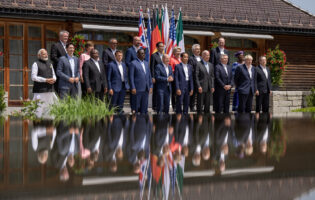A Breakthrough for Female Political Leaders?
On June 8, 2010, the American-German Institute (AGI) hosted a discussion with Dr. Isabelle Kürschner, DAAD/AGI Fellow, and Dr. Sarah E. Wiliarty, Assistant Professor of Government at Wesleyan University, on “Angela Merkel’s Chancellorship: Fortunate Circumstances or a Breakthrough for Female Political Leaders?” which was generously funded by the German Academic Exchange Service (DAAD) and the AGI Society, Culture & Politics Program. The speakers discussed women’s ascent to political leadership in the U.S. and Germany, focusing primarily on German Chancellor Angela Merkel, her path to office, and her role as the most powerful political leader in the country. Both speakers examined the latest developments surrounding women in politics and the remaining problems in Germany and in the U.S.
Dr. Isabelle Kürschner began by summarizing the situation for women in Germany: The world rankings compiled by the Inter-Parliamentary Union of women in national parliaments listed Germany seventeenth overall, with 33 percent of Bundestag members being women; the U.S., however, ranked sixty-ninth, with 17 percent of Members of Congress being women. Until the 1980s, there was no huge difference between the two countries; however, once the political landscape changed in Germany, there has been a rapid increase of the participation of women in politics. As the Green Party started to bring more women into the Bundestag, other parties followed suit in order to keep the female vote. Nevertheless, women’s participation depends greatly on party affiliation. Consequently, almost every party uses a different concept. The Green Party, the SPD, and the CDU, for example, use special gender quotas. While the Left Party uses positive discrimination to fight against underrepresentation of women, some parties – the FDP and the CSU – still refuse to use gender quotas because they argue those could undermine individual opportunity.
The German electoral system improves chances for women as a mixed-member electoral system, which combines proportional representation and the plurality principle. It is intended to ensure a close match between the percentage of votes that groups of candidates obtain in elections and the percentage of seats they receive. The voter casts two votes: One for a constituency representative (plurality) and one for a party (proportional). The division of seats in the Bundestag – half elected by direct voting and half by party lists – changes the political landscape for women. Although more men are elected by direct voting, women benefit more from the party list. However, there are still various handicaps for women. The Party Nomination Convention of most parties still consists almost entirely of men. Therefore, women who want to be successful have to play by the rules and accept the hierarchy. Another hurdle is the long and difficult process of being active in politics. Usually every political career starts at the local level. Thus, it can take fifteen years or longer to become a member of the Bundestag, making it hard for women who started in politics after starting a family. The third hurdle mentioned by Dr. Kürschner is the “old boys club,” which conducts meetings in traditionally male atmospheres. In this party environment it is difficult for women to adjust, and, for some, this is a reason for dropping out of politics.
Dr. Wiliarty focused on Angela Merkel’s rise within the CDU and media coverage of her campaigns in 2005 and 2009. Dr. Wiliarty argued that three main factors can explain Merkel’s rise: First, Germany’s gender egalitarian context and electoral system, in which there are much higher chances for women to be elected; second, the moment of “unusual times,” not only of unification, but also the CDU’s campaign finance scandal and Schröder’s calling early elections in 2005. Because of the early elections, the CDU had insufficient time to find an alternative candidate, opening the door for Merkel. The third factor is the CDU’s internal organization: The corporatist catch-all party needed to present a diverse leadership team and Merkel fulfilled three internal party “quotas” – female, Protestant, and from the former East Germany.
The second part of Dr. Wiliarty’s presentation looked at the quantity and quality of media coverage during both of Merkel’s campaigns. The analysis is based on her forthcoming book chapter “How the Iron Curtain Helped Break Through the Glass Ceiling: Angela Merkel’s Campaigns in 2005 and 2009.” Dr. Wiliarty stressed that although male candidates usually receive more media coverage, this was not the case during Merkel’s campaigns. While in 2005 the coverage was almost the same for both candidates, in 2009, Chancellor Merkel had even more coverage by the media. Concerning the type of media coverage, female candidates are usually mostly affiliated with “soft” issues such as education, welfare policy, and health policy. Issues such as foreign policy, economics, and taxes are more frequently associated with male candidates. Those “male issues” are regarded as more important for executive positions. However, Dr. Wiliarty’s content analysis showed that “female issues” simply were not a major part of the campaign, either in 2005 or 2009. Consequently, the coverage of issues affiliated with each candidate was remarkably similar. Thus, the trend of male issues being associated with executive office does not appear to have had any negative repercussions for Merkel’s candidacies.
Dr. Wiliarty’s next point concerned the effect of “easternness” on Merkel’s success. Appearance has been an issue for Merkel, and she has also made very significant changes over the past twenty years. However, the discussion in Germany was less about Merkel’s femininity and more about the question of whether she looks eastern or western. Her changes were mostly perceived as both feminizing and westernizing. While more femininity was mostly interpreted as becoming less politically competent, the western styling was seen as a symbol for more political competence. For Merkel, feminization overlapped directly with professionalization. Another benefit from her political outsider status (as an easterner) was the perception that she would bring desired change after the CDU’s financial scandal. Even though she was untainted, she already had experience working as a politician.
Finally, Merkel benefits from the soft-issue “mommy problem.” Women are in general more likely to be perceived as further to the left than men; however, as a woman from the right, Merkel is perceived as being from the left wing of her own party, placing her closer to the political center. Still, Merkel has a genuine “mommy problem” as well – she is childless and, as such, she does not embody the experiences of most women. The SPD declared her politics as partly responsible for the absence of children in Germany today. This framing of the problem is clearly about east/west issues as well as about professional women. Women in East Germany did not struggle to combine work and family, because there was free widely available daycare. Merkel is much more of an exception in the eastern context in her childlessness than in the western context. In 2009, her relationship to motherhood has been transformed, and she was made into a metaphorical mother of Germany. Some perceive her as the “people’s chancellor” and the “mother of all.” Dr. Wiliarty stressed that in portraying Merkel as a mother and a hostess, the media may be developing new positive stereotypical images for powerful female leaders.
The subsequent discussion touched on the issue of the declining number of women in the Bundestag, the lack of easterners in Merkel’s cabinet, and the problem of the existing “old boys’ network” in Germany. Another point discussed was the differences between Germany and the U.S., mainly in regard to the problems for women trying to participate in active politics. The discussion partners agreed that because of different cultural habits, it is easier for women to participate in political networks in the U.S., but at the same time, it is more difficult to get elected for a political position because of the American system. Consequently, while there is a need for structural change in the U.S., there is a need for cultural change in Germany.







